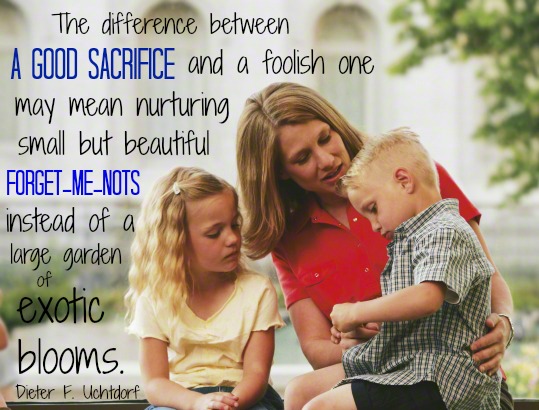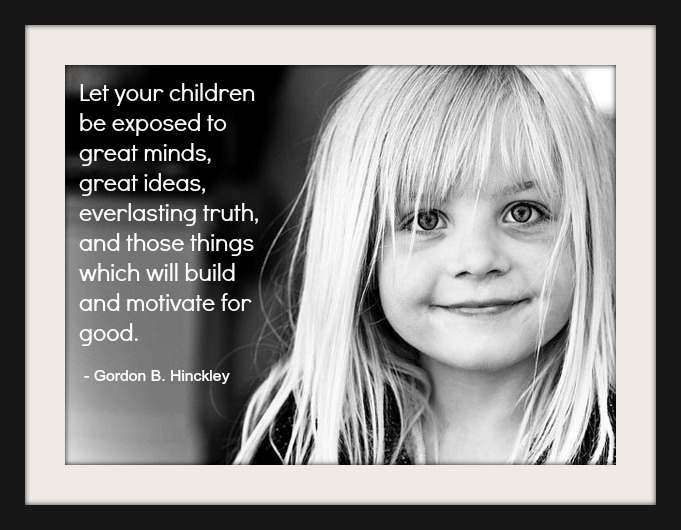Life is hard sometimes. Life with children is really hard sometimes. And trying to juggle careers and kids exponentially increases the level of difficulty. So many recent college graduates are saying they plan to opt out of parenthood altogether—58% of them, to be exact, according to a study of 2012 Wharton graduates. Twenty years earlier, that number was 22%. Interestingly, a Pew Research Center survey found that 69% of unmarried Millennials want to get married. So the rising generation wants to get married, but they don’t plan to have children because they don’t think they can balance having a career and kids. Stewart Friedman, author of the Wharton study and professor of management at the Wharton School of the University of Pennsylvania, attributes this to higher student debt load and an increase in the time requirements for work. This unfriendly environment toward family is taking its toll. Elder Dallin H. Oaks cited the following statistics:
• The United States now has the lowest birthrate in its history, and in many European Union nations and other developed countries, birthrates are below the level necessary to maintain their populations. This threatens the survival of cultures and even of nations. …
• In many countries and cultures (1) the traditional family of a married mother and father and children is coming to be the exception rather than the rule, (2) the pursuit of a career instead of marriage and the bearing of children is an increasing choice of many young women, and (3) the role and perceived necessity of fathers is diminishing.
The sad reality is that most young people want to have children, they just don’t know how to balance the demands of work and family. Children are our greatest assets, our highest eternal treasures, our best teachers. When more and more members of the rising generation fail to see how they can afford or make time to raise the next generation, our society is in real trouble. It’s time to create a culture where children and family can thrive—instead of where the wants of individuals are placed over the needs of children. This change doesn’t begin in the halls of government, it begins at home. President Gordon B. Hinckley said:
A nation will rise no higher than the strength of its homes. If you want to reform a nation, you begin with families, with parents who teach their children principles and values that are positive and affirmative and will lead them to worthwhile endeavors.
Millennials need to understand that they don’t have to choose whether to have a family or whether to have a career. The choice is how they will balance work and children—and the many options available to them.
Planning for Parenthood Must Be Our Priority
The world today sends the message that education and career come first and, if you can fit it in, marriage and children. As high school and college graduates plan for their future, it’s important that they plan for the long haul—and not just the short term. We need to teach the rising generation to look beyond the busy-ness of the here and now to the people they want to be at the end of the road. President Dieter F. Uchtdorf taught:
…When we are young, it seems that we will live forever. We think there is a limitless supply of sunrises waiting just beyond the horizon, and the future looks to us like an unbroken road stretching endlessly before us. However, the older we get, the more we tend to look back and marvel at how short that road really is. … And we begin to think about the choices we made and the things we have done. In the process, we remember many sweet moments that give warmth to our souls and joy to our hearts. But we also remember the regrets—the things we wish we could go back and change.
President Uchtdorf spoke of a nurse for the terminally ill who asked her patients about their regrets. The words of people who are dying should be lessons for those who still have life to live—and especially for our young adults whose entire lives lay ahead of them. He continued:
Perhaps the most universal regret dying patients expressed was that they wished they had spent more time with the people they love. Men in particular sang this universal lament: they “deeply regretted spending so much of their lives on the [daily] treadmill of … work.” Many had lost out on choice memories that come from spending time with family and friends. They missed developing a deep connection with those who meant the most to them.
Isn’t it true that we often get so busy? And, sad to say, we even wear our busyness as a badge of honor, as though being busy, by itself, was an accomplishment or sign of a superior life.
Perhaps our college graduates need to stand at the finish line and look back at what they want to accomplish, and then plan accordingly. There are many obstacles to raising a family in this world today. But I heard some advice once that I love: When you decide how many children to have, think about how many people you want to have at Thanksgiving dinner—not how many diapers you have to change to get there.
Balancing Career and Kids
The Millennial generation has some valid concerns about balancing careers and children in the world today. Many went to college during the Great Recession and came out with more student debt than the previous generation. They have seen the time requirement for jobs increase by 14 hours per week—up to a staggering 72 hours. While job opportunities have seemed to increase, housing costs in many areas require two incomes for a basic home. There is no doubt that balancing a career and children in the world today is difficult. But I think some young adults want to have kids without sacrificing the big house, the nice car and the 6-figure income. President Thomas S. Monson spoke to young men who were postponing marriage. His words ring true for couples postponing—or outright deciding against—having children:
I realize there are many reasons why you may be hesitating to take that step of getting married…. If you are concerned about providing financially for a wife and family, may I assure you that there is no shame in a couple having to scrimp and save. It is generally during these challenging times that you will grow closer together as you learn to sacrifice and to make difficult decisions. …
Perhaps you are having a little too much fun being single, taking extravagant vacations, buying expensive cars and toys, and just generally enjoying the carefree life with your friends. …There is a point at which it’s time to think seriously about marriage and to seek a companion with whom you want to spend eternity. If you choose wisely and if you are committed to the success of your marriage, there is nothing in this life which will bring you greater happiness.
This is true for marriage as well as the commitment to start a family. Young adults need to make having children a priority in their lives—and then work to achieve that goal.
This doesn’t mean that it will be easy. The workplace is often not family friendly—and some career paths are more hostile than others. Some jobs require a lot of man hours, which is difficult on the family. And some professions require employees to “pay their dues,” so to speak, before the time requirements ease up. Rather than opting out of parenthood, a husband and wife need to work together to meet the demands of the family. My husband worked in a time-commitment-rich job for several years. He traveled often, worked late and only took time off for our once-a year, weeklong summer vacation with his family. (Unfortunately, this isn’t really an exaggeration.) It was difficult. We had to learn to balance our time as individuals, as a couple and as a family—and we made a lot of mistakes. During this time, my husband interviewed for many other jobs. But we only took the job that would allow him more time with our family. It wasn’t a pay raise—but it was a higher quality of family life.
The 2-Income Trap
From the beginning of our marriage, my husband and I decided that I would stay home with our children. But when our oldest child was a year old, I was asked to return to work “temporarily” for two nights a week. Temporary turned into about 3 years. I loved what I was doing—and I didn’t know how we would be able to make it without the extra money. We fell into the trap of depending on two incomes. In the world today, it is more difficult than ever for a family to survive on a single income. Health care, housing and just the basic necessities of life for a family are rising—and it’s difficult to keep up. Elder M. Russell Ballard advised:
… Everyone faces financial challenges in life. Through wise budgeting, control your real needs and measure them carefully against your many wants in life. Far too many individuals and families have incurred too much debt. Be careful of the many attractive offers to borrow money. It is much easier to borrow money than it is to pay it back. There are no shortcuts to financial security. There are no get-rich-quick schemes that work. Perhaps none need the principle of balance in their lives more than those who are driven toward accumulating “things” in this world.
The trick is finding the balance of what we have to have and what we can live without. The Church of Jesus Christ teaches that husbands are to provide and protect and wives are to nurture and care for the children. These roles are divinely appointed in the family unit—but can be adapted as necessity dictates. Elder L. Tom Perry said:
Fathers most often spend much of their day away from home in their employment. That is one of the many reasons so much of the responsibility for teaching the child in the home falls on mothers. While circumstances do vary and the ideal isn’t always possible, I believe it is by divine design that the role of motherhood emphasizes the nurturing and teaching of the next generation. We see so many challenges today from distracting and destructive influences intended to mislead God’s children. We are seeing many young people who lack the deep spiritual roots necessary to remain standing in faith as storms of unbelief and despair swirl around them. … Teaching the gospel of Jesus Christ in the home adds another layer of insulation to protect our children from worldly influences.
Many of these influences are aimed at destroying the family—beginning with the role of mother and father. Elder D. Todd Christofferson said:
A pernicious philosophy that undermines women’s moral influence is the devaluation of marriage and of motherhood and homemaking as a career. Some view homemaking with outright contempt, arguing it demeans women and that the relentless demands of raising children are a form of exploitation. They ridicule what they call “the mommy track” as a career. This is not fair or right. We do not diminish the value of what women or men achieve in any worthy endeavor or career—we all benefit from those achievements—but we still recognize there is not a higher good than motherhood and fatherhood in marriage. There is no superior career, and no amount of money, authority, or public acclaim can exceed the ultimate rewards of family. Whatever else a woman may accomplish, her moral influence is no more optimally employed than here.
The world today tells women that they need a job outside of the home because their families can’t make it without a second income—and sometimes this is true. Our family has lived in resort towns for the last decade. And these towns, which depend on tourism, flourish in a booming economy and struggle during a recession. For many families in our area, the wife has had to go to work to supplement the husband’s income—and often the husband has more than one job. But it’s important that we make sure that we are basing our decisions on the proper criteria of real needs versus material wants.
Children Are Worth Every Sacrifice Required of Us
Children are worth every sacrifice that parents, government and society need to make. Friedman and his colleagues are calling on the government to make family friendly changes to the laws. Lawmakers and other government and civic leaders must understand the cost of not protecting families. The disintegration of the family has a high cost financially, physically, emotionally and spiritually—for individuals, families and the nation. Americans are paying for this in rising welfare costs and the increase in law enforcement required to combat gangs and other inner-city problems, just to name a few. In contrast, if we don’t have enough children to sustain the population, we won’t have enough workers to support the older generations. As Elder Oaks warned:
The national birthrate in the United States is the lowest in 25 years, and the birthrates in most European and Asian countries have been below replacement levels for many years. This is not just a religious issue. As rising generations diminish in numbers, cultures and even nations are hollowed out and eventually disappear.
It’s interesting to me how rather than figuring out how to balance the careers and jobs, many young people are just throwing in the towel altogether. President Henry B. Eyring said:
Many voices in the world today marginalize the importance of having children or suggest delaying or limiting children in a family. My daughters recently referred me to a blog written by a Christian mother (not of our faith) with five children. She commented: “[Growing] up in this culture, it is very hard to get a biblical perspective on motherhood. … Children rank way below college. Below world travel for sure. Below the ability to go out at night at your leisure. Below honing your body at the gym. Below any job you may have or hope to get.” She then adds: “Motherhood is not a hobby, it is a calling. You do not collect children because you find them cuter than stamps. It is not something to do if you can squeeze the time in. It is what God gave you time for.”
With the rising cost of health care, housing and education—not to mention the basic necessities such as food and clothing—it’s expensive to raise children. Add to that the emotional, physical and spiritual resources required. The rising generation is getting the message: raising kids is hard. What they apparently aren’t hearing is this: No matter what the cost, no matter what sacrifices you have to make, having children is worth it. Children are worth every sacrifice of time, money and other resources that they require. If we as a society are going to succeed, we need to defend and support the traditional family unit—and ensure that the rising generation understands that Whitney Houston had it right: Children are our future.






